Access Arrangements for GCSE AS and A level: 2019 to 2020 academic year
Published 17 December 2020
Applies to England
This report provides information on the number of access arrangements approved for GCSE, AS and A level in England during the 2019/20 academic year.
Access arrangements are approved before candidates take an assessment. This statistical release covers access arrangements approved in advance of exams in 2019/20, including the summer exams that were subsequently cancelled due to the coronavirus (COVID-19) pandemic.
1. Main trends
The main trends in access arrangements for GCSE, AS and A Level for the 2019/20 academic year in England were:
-
There were 460,750 approved access arrangements, up 13.9% on 2018/19. Please note that more than one type of access arrangement can be granted per candidate. We are not aware of the reasons for this magnitude of increase in the number of access arrangement applications this academic year and are working with exam boards to understand any potential reasons.
-
5,375 centres (91.1% of all centres) had approved access arrangements for one or more of their candidates this year, a similar percentage to last year.
-
25% extra time arrangements made up 64.6% of all approved arrangements in 2019/20, compared to 63.4% in 2018/19.
2. Total number of approved arrangements
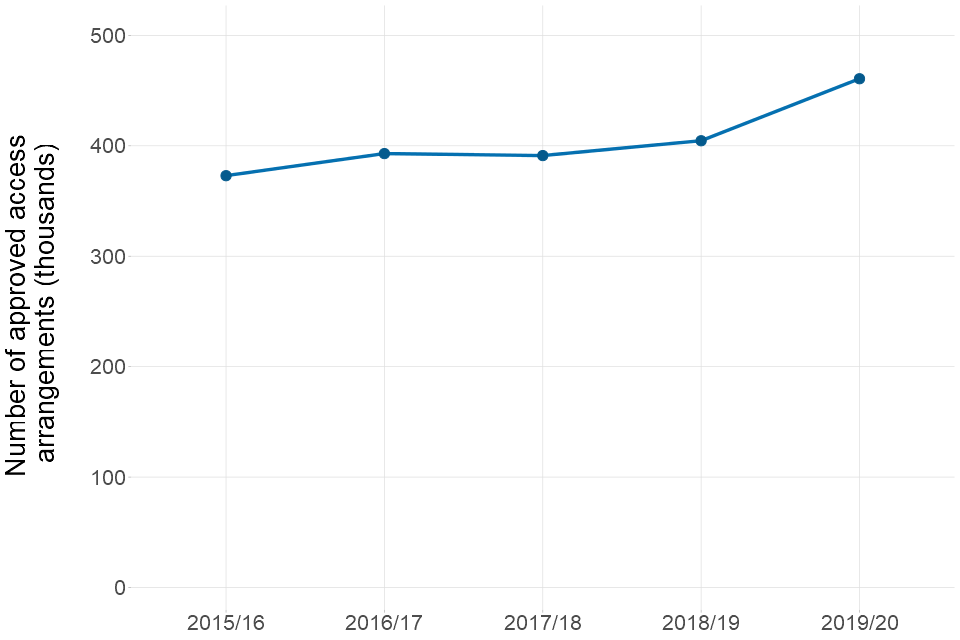
| Academic year | Number of approved access arrangements |
|---|---|
| 2015/16 | 372,960 |
| 2016/17 | 392,980 |
| 2017/18 | 391,185 |
| 2018/19 | 404,600 |
| 2019/20 | 460,750 |
There were 460,750 approved access arrangements in 2019/20, up 13.9% on 2018/19. This was against the rise in the number of candidates by 2.8% from 1,322K in 2018/19 to 1,360K in 2019/20. The change was mainly attributed to increases in the numbers of access arrangements in the following categories; 25% extra time (up 16%), Computer reader/reader (up 12.2%) and Scribe/speech recognition (up 7.3%).
5,375 centres (91.1% of all centres) had approved access arrangements for one or more of their candidates this year, a similar percentage to last year.
3. Most common types of access arrangements
3.1 Access arrangements changes over time
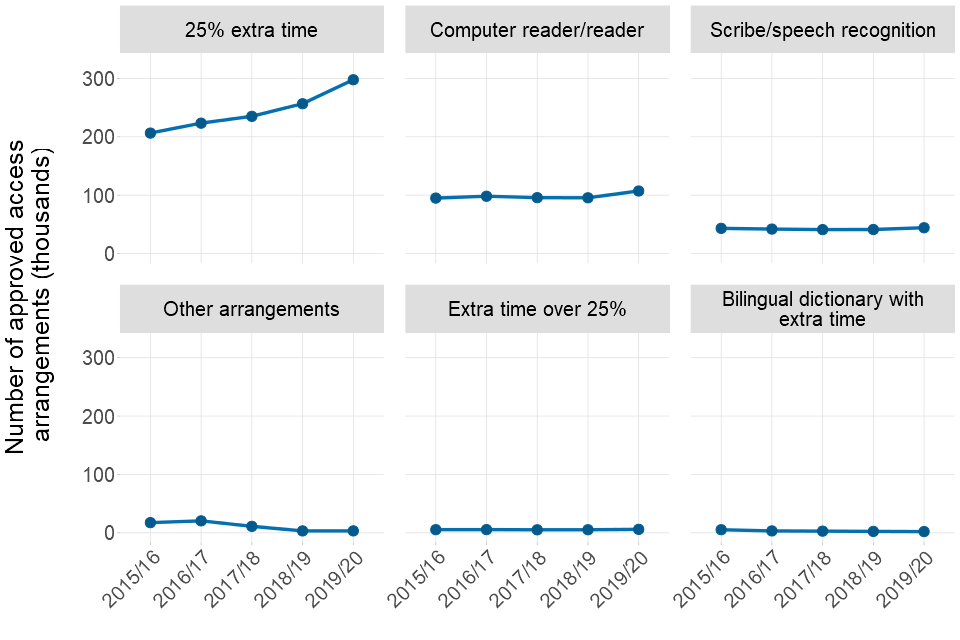
| Access Arrangement | 2015/16 | 2016/17 | 2017/18 | 2018/19 | 2019/20 |
|---|---|---|---|---|---|
| 25% extra time | 206,425 | 223,425 | 235,105 | 256,710 | 297,810 |
| Computer reader/reader | 95,060 | 98,225 | 95,795 | 95,570 | 107,205 |
| Scribe/speech recognition | 43,205 | 41,965 | 41,075 | 41,255 | 44,255 |
| Extra time over 25% | 5,435 | 5,530 | 5,190 | 5,300 | 5,975 |
| Other arrangements | 17,490 | 20,525 | 11,115 | 3,315 | 3,355 |
| Bilingual dictionary with extra time | 5,345 | 3,320 | 2,905 | 2,450 | 2,150 |
| Total | 372,960 | 392,980 | 391,185 | 404,600 | 460,750 |
25% extra time, Computer reader/reader and Scribe/speech recognition were the most common access arrangements among all approved access arrangements.
The number of approved 25% extra time arrangements has continued to rise. There was an increase in the numbers of all most common access arrangements except for the use of bilingual dictionaries with extra time in 2019/20, compared to 2018/19 academic year.
A further breakdown of ‘other arrangements’ is given in the data tables.
3.2 Proportions of all approved access arrangements
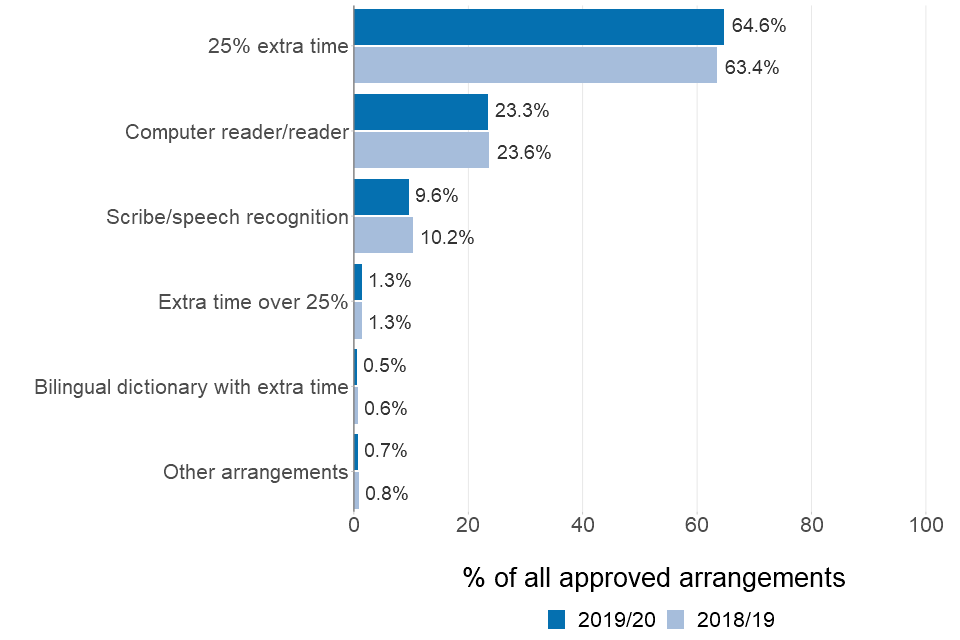
| Access arrangement | % of all approved arrangements in 2018/19 | % of all approved arrangements in 2019/20 |
|---|---|---|
| 25% extra time | 63.4% | 64.6% |
| Computer reader/reader | 23.6% | 23.3% |
| Scribe/speech recognition | 10.2% | 9.6% |
| Extra time over 25% | 1.3% | 1.3% |
| Bilingual dictionary with extra time | 0.6% | 0.5% |
| Other arrangements | 0.8% | 0.7% |
25% extra time access arrangements made up 64.6% of all approved access arrangements in 2019/20, compared to 63.4% in 2018/19.
Computer reader/reader access arrangements made up 23.3% of all approved access arrangements in 2019/20, compared to 23.6% in 2018/19.
Scribe/speech recognition access arrangements made up 9.6% of all approved access arrangements in 2019/20, compared to 10.2% in 2018/19.
Further information on all arrangements is given in the data tables.
3.3 Approved access arrangments as a proportion of candidates
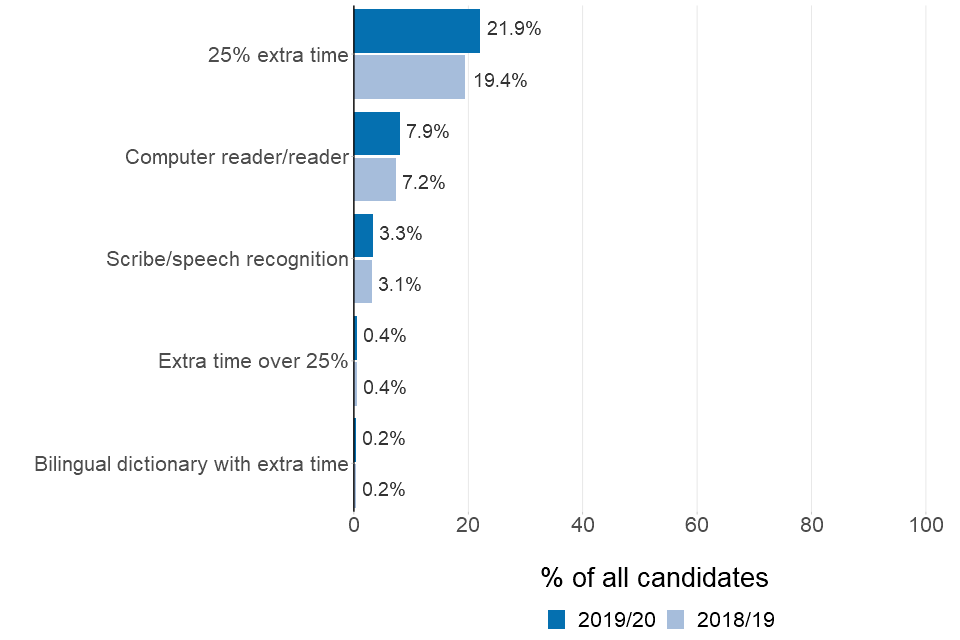
| Access arrangement | % of all candidates in 2018/19 | % of all candidates in 2019/20 |
|---|---|---|
| 25% extra time | 19.4% | 21.9% |
| Computer reader/reader | 7.2% | 7.9% |
| Scribe/speech recognition | 3.1% | 3.3% |
| Extra time over 25% | 0.4% | 0.4% |
| Bilingual dictionary with extra time | 0.2% | 0.2% |
25% extra time access arrangements were approved for 21.9% of all candidates taking exams in 2019/20, compared to 19.4% in 2018/19.
Computer reader/reader access arrangements were approved for 7.9% of all candidates taking exams in 2019/20, compared to 7.2% in 2018/19.
Scribe/speech recognition access arrangements were approved for 3.3% of all candidates taking exams in 2019/20, compared to 3.1% in 2018/19.
Please note that more than one type of access arrangement can be granted per candidate. As we do not collect access arrangements data at candidate level, we are unable to calculate the percentage of candidates taking exams for ‘other arrangements’.
3.4 Proportions of all approved access arrangements by centre type
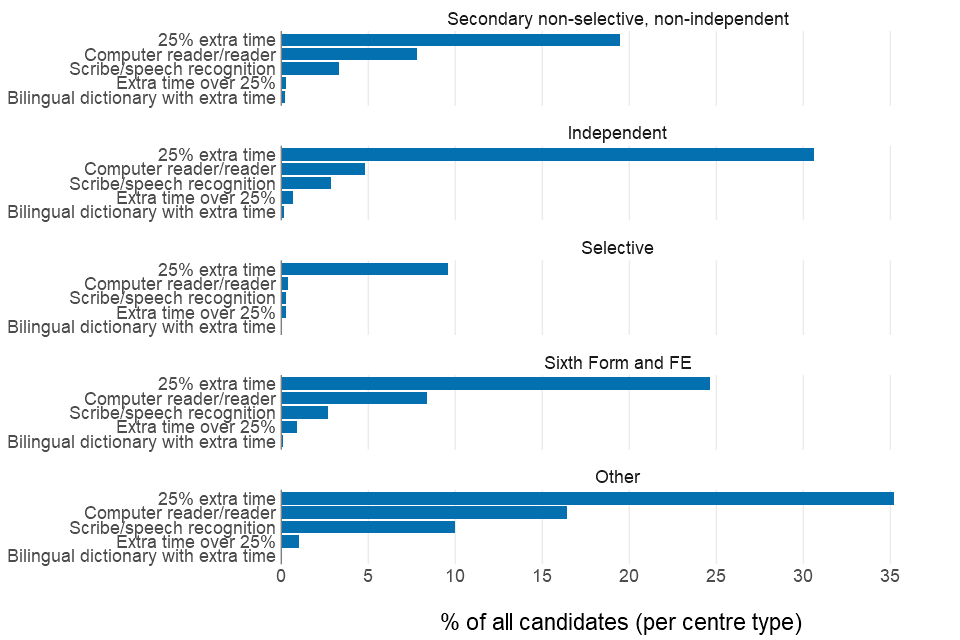
| Access arrangement | % of all candidates in Secondary non-selective, non-independent centres | % of all candidates in Independent centres | % of all candidates in Selective centres | % of all candidates in Sixth Form and FE centres | % of all candidates in Other centres |
|---|---|---|---|---|---|
| 25% extra time | 19.4% | 30.6% | 9.5% | 24.6% | 35.2% |
| Computer reader/reader | 7.8% | 4.8% | 0.4% | 8.4% | 16.4% |
| Scribe/speech recognition | 3.3% | 2.9% | 0.2% | 2.6% | 10.0% |
| Extra time over 25% | 0.2% | 0.6% | 0.3% | 0.9% | 1.0% |
| Bilingual dictionary with extra time | 0.2% | 0.1% | 0.0% | 0.1% | 0.0% |
The most common access arrangement approved in all centre types was 25% extra time (ranging from 25% of candidates in Sixth Form and FE centres to 35% of candidates in “Other” centres).
The second most common access arrangement for all centre types was a Computer reader/reader (ranging from 8% of candidates in Sixth Form and FE centres to 16% of candidates in “Other” centres).
Scribe/speech recognition was the third most common access arrangement for all centre types (ranging from 3% of candidates in Independent centres to 10% of candidates in “Other” centres).
The “other” centre type includes special schools, colleges of higher education, university departments, tutorial colleges, language schools, pupil referral units (PRU), HM Young Offender Institutes (HMYOI), HM Prisons, training centres, and unknown centre types.
Please note that an individual candidate can be granted more than one type of access arrangement, meaning that individual candidates may contribute to the figures for multiple arrangement types within a centre type. As we do not collect access arrangements data at candidate level, we are unable to calculate the percentage of candidates taking exams for ‘other arrangements’ across centre types.
4. Contextual information
In this report, Ofqual presents data on access arrangements approved for GCSE, AS and A level exams during the 2019/20 academic year in England.
Access arrangements are the provisions made for students, agreed before they take an assessment, to ensure that they can be validly assessed and are not unfairly disadvantaged due to a disability, temporary illness or injury or if their first language is not English. Any student with a disability (as defined by the Equality Act 2010 - ie has a physical or mental impairment that has a substantial and long-term negative effect on their ability to do normal daily activities) is legally entitled to reasonable adjustments, which are a form of access arrangement. Access arrangements should not be confused with post-examination adjustments to the marks of students who have not been able to demonstrate their ability in an assessment due to exceptional circumstances, such as bereavement at the time of the assessment. These post-examination adjustments are covered in a separate report on special consideration. Please note that due to the cancellation of exams in 2020, there is no 2020 release of the special consideration report.
Any students taking GCSE, AS or A level exams or non-exam assessments who meet the exam boards’ eligibility criteria can have an access arrangement. Individual students may require more than one form of access arrangement. According to JCQ guidelines, once granted, an arrangement will apply for up to 26 months, although applications based on temporary conditions will last for one exam series only.
While other types of arrangements can be requested without needing the approval of exam boards, the data in this release only cover those arrangements which are granted through JCQ’s Access Arrangements Online system (detailed in JCQ guidelines).
In this release, all figures are rounded to the nearest 5 to ensure confidentiality of the data. Further information on this release is available in the background information as well as the data tables accompanying this report.
Figures for modified papers for 2020 are not presented in this release. No exams took place in summer 2020 due to the coronavirus (COVID-19) outbreak and data on modified papers has not been collected.
5. User feedback
We welcome your feedback on our publications. Should you have any comments on this statistical release and how to improve it to meet your needs please contact us at data.analytics@ofqual.gov.uk.
Head of profession: Vikas Dhawan

